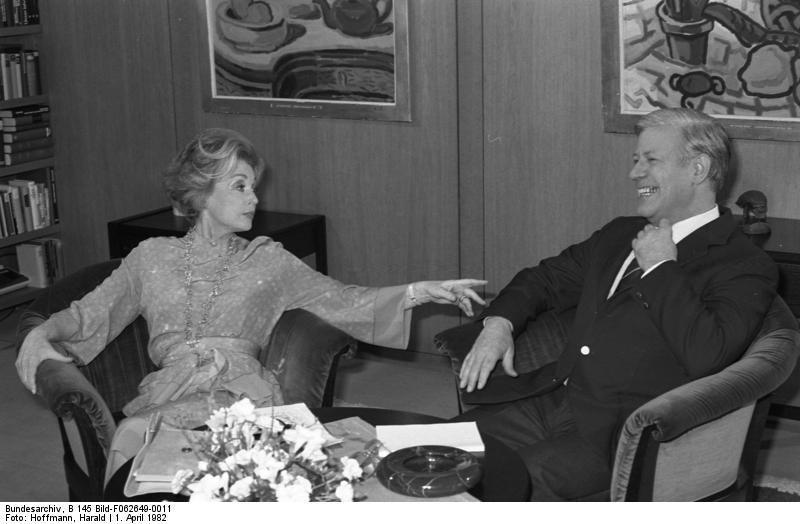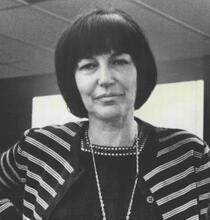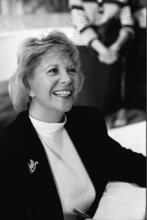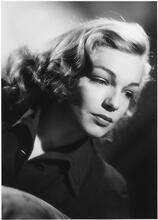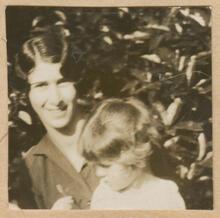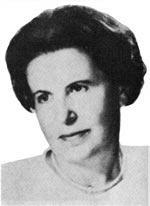Lilli Palmer
Actress Lilli Palmer fled Nazi Germany after her theater contracts were revoked and she was branded a “non-Aryan” and narrowly escaped arrest. She first fled to Paris and then to London, where she acted in her first film and married Rex Harrison in 1943. Following Harrison to Hollywood, she made a name for herself and was immortalized with a star on the “Walk of Fame.” In 1948, they moved to New York, where Palmer shifted from films to theater. Palmer returned to Germany in 1953 to make several award-winning films. She later turned her hand to painting, writing, and hosting a talk show with Dick Cavett.
“There was never any doubt in my mind that I would become an actress,” Lilli Palmer wrote in her autobiography. Defying the wish of her physician father Alfred Peiser (d. 1934) that she study medicine, Palmer fulfilled her own prophecy by following instead in the footsteps of her mother, actor Rose Lissmann. Palmer became not only a prominent actor in numerous successful plays, films and television programs, but also a painter and an author of both fiction and non-fiction.
Early Life and Family
Lilli Peiser was the middle daughter born to an assimilated Jewish family in Posen, Germany (now Poznan, Poland) on May 24, 1914. She had two sisters, Irene (?) and Hilde (b. 1921). As she later wrote in her memoirs, she was reminded in her childhood only once a year that she was Jewish, when she was discouraged from participating in the school Christmas play. But she acted in many other performances at the Open Air School in Berlin-Grunewald—where she already took the stage name of Palmer, who was a friend and colleague of her mother—and secured a contract with the well-reputed Darmstadt State Theater upon graduation from drama school. After Hitler came to power in 1933 Palmer soon faced grave reminders of her Jewish heritage. Her recently negotiated two-year contract with the Frankfurt Playhouse was cancelled. Branded a “non-Aryan” she came near to being arrested by local Nazi authorities during a performance in Darmstadt. After a harrowing opening before rows of Storm Troopers, Palmer was spared at the last minute when they learned of the World War I Iron Cross medal earned by her father, who was at this point serving as chief surgeon at Berlin’s largest Jewish hospital.
Acting in Exile: London, Paris, Hollywood, Broadway
These events forced Palmer into exile, the first year of which she spent in Paris. Hindered by linguistic, cultural and bureaucratic barriers, Palmer and her sister Irene barely scraped by with performances at the Moulin Rouge and at nightclubs. But Palmer was able to establish connections which led to a screen test in London, where she landed a part in her first film, Crime Unlimited (1935). Soon she signed a contract with the Gaumont-British film company and after various hurdles in obtaining work permits in England she was eventually granted a permanent permit, lending some security to her life in exile.
In London Palmer met one of her greatest influences, Elsa Schreiber, considered by many to be a mediocre actor but a marvelous acting teacher. Schreiber taught her the subtleties of refining a character and a script—a method which later brought Palmer into conflict with some of her directors—and helped Palmer with her roles for years to come.
Palmer married actor and frequent co-star Rex Harrison (1908–1990) in 1943 and had their son, Carey, in 1944. The family narrowly survived air-raid bombings during wartime in England. They moved to Hollywood in November 1945 for Harrison’s role in Anna and the King of Siam. Palmer quickly resumed her career with the lead role opposite Gary Cooper in Cloak and Dagger, amid heated disputes with émigré director Fritz Lang (1890–1976) which nearly caused her to withdraw from filming. With such films as Body and Soul (1947), My Girl Tisa (1948) and No Minor Vices (1948), Palmer continued to make a name for herself in Hollywood, where she was eventually immortalized with a star on the “Walk of Fame.”
After a scandal involving the 1948 suicide of Harrison’s lover, actor Carole Landis, Palmer and Harrison moved to New York and sought work on Broadway. Palmer quickly revived her reputation with such successes as George Bernard Shaw’s Caesar and Cleopatra (1949) and, starring with Harrison, John van Druten’s Bell, Book and Candle (1950). Harrison and Palmer divorced in 1957, and Palmer married Argentine movie star and writer Carlos Thompson (1923–1990) the following year.
When Palmer returned to Germany to make the film Fireworks (1953) she realized her German had grown rusty during her prolonged absence: she did not know the technical terms for making movies in German. In addition, she struggled with being back in her home country for the first time since 1933 and was haunted by the question “What did a former Nazi party member look like today?” (Change Lobsters—and Dance 257). Palmer made several more German films, including Devil in Silk (1956), Anastasia: The Czar's Last Daughter (1956), Between Time and Eternity (1956) and Tempestuous Love (1957). She won the Berlin Film Festival’s best actress award for the drama Devil in Silk in 1956, three years after winning the Venice Film Festival’s Volpi Cup for The Four Poster.
Working with New Media: Painting, Television, and Writing
Palmer once noted that she wanted to be remembered simply as a person who had led an interesting life (Huebner, 235). The varied activities undertaken in the last few decades of her life only increased her chances of this commemoration. She began to pursue more seriously her hobby of painting, even receiving advice and encouragement from the renowned painter Oskar Kokoschka. An exhibit at London’s Tooth Gallery showcased twenty-five of Palmer’s paintings, most of which were sold on the spot. Palmer also displayed her writing talents in a witty and best-selling autobiography, Change Lobsters—and Dance, as well as four novels and a short-story collection.
Gradually decelerating her movie-making, Palmer began work in another popular medium: television. In 1972 she acted in a German comedy, “A Woman Remains a Woman” (Eine Frau bleibt eine Frau), for which she won a Golden Camera award. She also did much of the show’s writing under the pseudonym of her grandfather’s name, Herrmann Lissmann. Palmer soon became a familiar television personality, hosting a talk show with Dick Cavett in 1979 and conducting a candid interview with German Chancellor Helmut Schmidt in 1982. In 1987 she received a posthumous Golden Globe nomination for her supporting part in the American mini-series Peter the Great. Despite her fame in many diverse areas, resulting in occasional mud-slinging from the press, Palmer always made time for her fans, whose books she happily autographed.
In May 1985, as she worked fervently on her final book, When the Nightbird Cries, Palmer hid her diagnosis of abdominal cancer from friends and family. She died in Carlos Thompson’s arms in Los Angeles on January 27, 1986, having left her mark as an accomplished actor of stage and screen, painter, and writer.
Filmography
1935 Crime Unlimited
1936 First Offence
Secret Agent
1937 Secrets of the Stars
Good Morning, Boys
The Great Barrier
Sunset in Vienna
1938 Crackerjack
1939 A Girl Must Live
Blind Folly
1940 The Door with Seven Locks
1942 Thunder Rock
1943 The Gentle Sex
English without Tears
1945 The Rake’s Progress
1946 Beware of Pity
Cloak and Dagger
1947 Body and Soul
1948 My Girl Tisa
No Minor Vices
1949 Hans le Marin
1951 The Long Dark Hall
Pictura: Adventures in Arts
1952 The Four Poster
1953 Main Street to Broadway
Feuerwerk (Fireworks)
1956 Teufel in Seide (Devil in Silk)
Anastasia—Die letzte Zarentochter (Anastasia: The Czar's Last Daughter)
Zwischen Zeit und Ewigkeit (Between Time and Eternity)
1957 Wie ein Sturmwind (Tempestuous Love)
Der gläserne Turm (The Glass Tower)
Montparnasse 19
1958 Eine Frau, die weiß, was sie will (A Woman Who Knows What She Wants)
Mädchen in Uniform (Girl in Uniform)
La vie à deux (Life as a Couple)
1959 But Not For Me
Conspiracy of Hearts
1960 Frau Warrens Gewerbe (Mrs. Warren’s Profession)
The Pleasure of His Company
The Counterfeit Traitor
1961 Frau Cheneys Ende (The End of Mrs. Cheney)
Le rendez-vous de minuit (Rendezvous at Midnight)
Julia, du bist zauberhaft (Adorable Julia)
Finden Sie, daß Constanze sich richtig verhält?
L’Amour difficile (Of Wayward Love)
Leviathan
1963 The Miracle of the White Stallion
Beta Som (Torpedo Bay)
Das große Liebesspiel (And So to Bed)
1964 Le grain de sable (The Circular Triangle)
1965 Operation Crossbow
The Amourous Adventures of Moll Flanders
Le tonnerre de dieu (The Thunder of God)
1966 Der Kongreß amüsiert sich (Congress of Love)
Zwei Girls vom roten Stern (An Affair of States)
Le voyage du père
1967 Jack of Diamonds
Sebastian
Oedipus the King
1968 Paarungen (The Dance of Death)
Nobody Runs Forever
Hard Contract
1970 The Other Side of the Wind
Le peau de torpedo (Only the Cool)
De Sade
La residenica (The House that Screamed)
1971 Hauser’s Memory
Night Hair Child
Murder in the Rue Morgue
Lotte in Weimar
The Boys from Brazil
1972 Diabólica malicia (Child of the Night)
1982 Feine Gesellschaft—Beschränkte Haftung (High Society Limited)
1985 The Holcroft Covenant
Theater
1932– Contract with Darmstadt State Theater
1933
1936 The Road to Gandahar, London
1938 Little Ladyship, London
1939 The Captain’s Lamp, London
You of All People, Birmingham
1941 No Time for Comedy, various cities in England and Scotland
1949 My Name is Aquilon, New York
Cesar and Cleopatra, New York
1950 Anta Album—The Dark Lady of the Sonnets, New York
Bell, Book and Candle, New York
1952 Venus Observed
1953 The Love of Four Colonels, various cities in the U.S. and Canada
1954 Bell, Book and Candle, London
1966 Suits in Three Keys, London
1981 Sarah in America, Washington, D.C.
1984 Whose Life Is It Anyway? Vienna
Television Appearances
1967 Zwischenstationen mit Lilli Palmer
1971 Anneliese Rothenberger gibt sich die Ehre
Der Kommissar
1972 Eine Frau bleibt eine Frau
1973 Eine Frau bleibt eine Frau
Lilli Palmer präsentiert Opernstars
1974 The Zoo Gang
1976 Stars in der Manege
1977 Das ist ihr Leben—Lilli Palmer
1978 Eine Frau bleibt eine Frau
1979 Eine Frau bleibt eine Frau
Dick Cavett und Lilli Palmer: Zwei Stars über Stars Samstagsklub
1980 Weekend
1981 Kinder
Heut’ abend
1982 Helmut Schmidt-unpolitisch
Heut’ abend
Unglaubliche Freunde
Eine etwas sonderbare Dame
1984 Love Boat (guest-starred as a best-selling author named Lilli)
1986 Peter the Great
Books
1974 Dicke Lilli—Gutes Kind
1976 Change Lobsters, and Dance
Der rote Rabe
1978 The Red Raven
1979 Umarmen hat seine Zeit (Time to Embrace)
1981 Nachtmusik (Night Music)
1984 Um eine Nasenlänge (Face Value)
1986 Wenn der Nachtvogel schreit (When the Nightbird Cries)
Huebner, Michael O. Lilli
Palmer. Ihre Filme—ihr Leben. Munich: 1986.
Details the life and films of Lilli Palmer, and includes a complete filmography.
Palmer, Lilli. Change
Lobsters—and Dance. New York: 1975.
The English version (though not a direct translation) of Palmer’s German autobiography
Dicke
Lilli—Gutes Kind.
Weno, Joachim. Lilli
Palmer. Berlin: 1957.
Early biography of Lilli Palmer.

